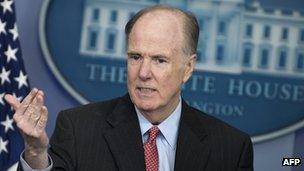US official in China hacking call
- Published

Mr Donilon said cyber theft posed a risk to US-China relations
The Chinese government should acknowledge and investigate cyber-theft from China, a top US official has said.
National Security Adviser Thomas Donilon said cyber security was a "growing challenge" to the US economic relationship with Beijing.
The pointed remarks appeared to reflect growing US concern over cyber-crimes said to originate in China.
On Saturday China's foreign minister criticised claims China was behind hacking attacks on US companies.
'Acceptable norms'
on Monday, Mr Donilon said that US businesses were increasingly concerned about "cyber intrusions emanating from China" that stole confidential business information or intellectual property.
"We seek three things from the Chinese side," he said. "First, we need a recognition of the urgency and scope of this problem. Second, Beijing should take serious steps to investigate and put a stop to these activities."
"Finally, we need China to engage with us... to establish acceptable norms of behaviour in cyberspace."
China has long been suspected of a role in cyber-hacking. But the issue has become more high-profile in recent months following widely reported hacks into media outlets including the New York Times - in that case apparently linked to a report by the paper on the wealth of relatives of outgoing Premier Wen Jiabao.
, US cyber security firm Mandiant said that it had linked hundreds of data breaches since 2004 to a Chinese hacking team it had traced to the site of a military unit in Shanghai.
Last month, US State Department spokeswoman Victoria Nuland said that the hacking issue came up "in virtually every meeting we have with Chinese officials".
China, which called the Mandiant report flawed, says that it opposes hacking activities and is a victim of cyber attacks itself.
Speaking on Saturday, Chinese Foreign Minister Yang Jiechi said: "Cyberspace needs rules and co-operation, not war."
He criticised recent reports that said China was responsible for cyber attacks against Western companies, saying they were "built on shaky ground."
- Published20 February 2013
- Published19 February 2013
- Published31 January 2013
- Published19 February 2013